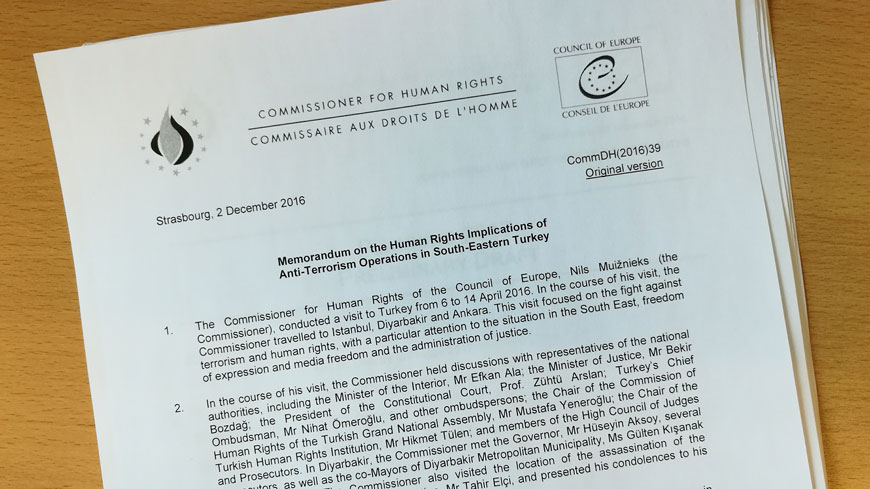“Numerous human rights of a very large civilian population in South-Eastern Turkey have been violated as a result of curfews imposed and anti-terrorism operations conducted there since August 2015. I call on Turkey to stop using curfews in such a manner, investigate all allegations of human rights violations by state agents in an effective manner and put in place comprehensive schemes for redress and compensation. Failure to do so will further aggravate the initial violations” said Nils Muižnieks, Council of Europe Commissioner for Human Rights, in a Memorandum published today. The Memorandum presents the findings of a visit that he conducted to Turkey (Istanbul, Diyarbakir and Ankara) from 6 to 14 April 2016, and a subsequent visit to Ankara from 27 to 29 September 2016.
The Commissioner’s assessment is based on a careful analysis, on the basis of international standards and the case-law of the European Court of Human Rights, of anti-terrorist measures, in particular of the legality and proportionality of the open-ended, round-the-clock curfews which lasted for many months in certain cases.
“Turkey faces a real terrorist threat, and it has the right and duty to fight against terrorism in all its forms. I condemn the actions of the PKK and other terrorist organisations. Terrorism is a human-rights violation, but the response Turkey adopted in the South East since the summer of 2015 caused violations of human rights in its own right, due to measures which involve problems of proportionality and legality.”
The Commissioner highlights in particular that the curfews imposed since August 2015 were based on administrative decisions infringing legality requirements according to the Venice Commission of the Council of Europe. He also points to the tremendous destruction in several cities and the huge disproportion when the number of civilians affected, including those displaced for long periods, and of properties destroyed is compared with the number of terrorists neutralised and the declared aims behind the curfews. In addition, the widely-reported chauvinistic behaviour of security forces has in many cases reinforced a “perception of the curfews and anti-terrorism operations as ‘collective punishment’ among the civilian population”.
The Commissioner is furthermore concerned that the Turkish authorities did not treat with the requisite seriousness numerous allegations of human rights violations from credible sources, nor conduct effective ex officio criminal investigations into the deaths occurring during anti-terrorism operations, despite the fact that it is under the obligation to prove convincingly that state agents have taken all necessary precautions to avoid casualties in each and every case. He regrets that “the priority seems to have rather been to reassure and shield from prosecution the security forces, who have only been subjected to disciplinary sanctions for particularly egregious forms of misconduct with the exception of very few criminal cases where they were treated as suspects”. The Commissioner also expressed deep concern about attempts by the authorities to vilify the activities of human rights NGOs and lawyers bringing to attention allegations of human rights violations which occurred in zones cut from the rest of the world where there were no independent observers.
Commissioner Muižnieks highlights that investigations so far seem largely ineffective, because they have not been immediate, diligent and thorough. “Given the elapsed time since some of the operations, the fact that evidence might have been destroyed with heavy machinery in the affected zones, as well as the general attitude of prosecutors, it seems very improbable that any future investigation will fully satisfy the criteria for effectiveness.” This entails further human rights violations and is consistent with previous findings of the Commissioner and the large body of case-law concerning the entrenched problem of lack of accountability and impunity in Turkey. “Impunity has consistently legitimised and fostered behaviour fundamentally at odds with human rights, and undermined efforts to protect and promote them throughout Turkey’s recent history”.
“I call on the government of Turkey to acknowledge publicly the mistakes and human rights violations committed and to adopt measures able to compensate moral and material damages suffered by the people concerned, be it because of the failure of the Turkish state to protect them from terrorism or the direct effect of the anti-terrorist operations themselves” said the Commissioner. He also expressed his impression that the existing framework for compensation appeared inadequate in this respect, as well as his concern about the government’s plans to expropriate residents in affected areas, which may amount to double punishment.
The Commissioner stressed that “the recognition of these mistakes and seeking to remedy their impact would not be a sign of weakness; on the contrary, this would support the improvement of the human rights situation and of public trust in the state, a fundamental requisite for peace and stability in the country.”



